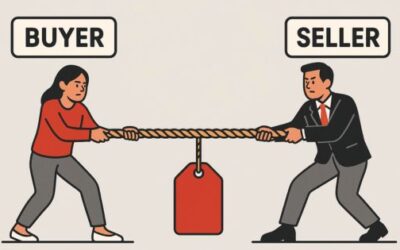These are the most recommended sales books written in the last 10 years(ish). The list reflects input from sales leaders, enablement professionals, and active seller communities.
Each book introduces a repeatable concept, framework, or approach that sales teams continue to apply. Topics range from negotiation and prospecting to emotional intelligence and buyer behavior. These titles represent how top-performing teams approach sales today.
If you’re in sales enablement or leading a revenue team, these are the books your peers trust most and the ones reps actually apply in live deals.
Never Split the Difference by Chris Voss (2016)
Voss applies FBI negotiation tactics to sales conversations. He breaks down specific techniques like calibrated questions, mirroring, and tactical empathy. The goal is to influence outcomes through tone, control, and deep listening. Sales teams use it to improve closing performance, especially in complex or high-stakes deals.
Fanatical Prospecting by Jeb Blount (2015)
Blount emphasizes consistency and volume in outbound activity. He offers practical structures for time-blocking, call discipline, and messaging. The book focuses entirely on top-of-funnel performance and rejects excuses around timing, tools, or lead quality. It’s widely adopted by SDR and AE teams that need repeatable prospecting habits.
Want to sharpen your cold outreach? Start with the 5 most recommended prospecting books.
Gap Selling by Keenan (2018)
This book reframes the sales process around diagnosing a buyer’s current state and future goals. Keenan introduces a problem-centric model built to uncover root causes, impacts, and business-level challenges. The methodology is structured to create urgency and reduce discounting. It’s frequently used in enterprise and solution-based sales cycles.
The JOLT Effect by Matthew Dixon & Ted McKenna (2022)
The JOLT framework addresses indecision an issue that causes more deal loss than direct objections. The authors recommend guiding buyers through risk, uncertainty, and internal delays using a structured process: Judge, Offer, Limit, Take Risk. The book is backed by research and applies to sales teams navigating consensus-driven or complex buying environments.
The Transparency Sale by Todd Caponi (2018)
Caponi advocates leading with flaws to build trust. His research shows that transparency reduces buyer skepticism and shortens decision cycles. He introduces concepts like the “4.3-star review effect” and explains how perceived imperfection drives credibility. The book resonates with teams in competitive or technical markets.
Insight Selling by Mike Schultz & John Doerr (2014)
Built from a study of over 700 B2B purchases, this book identifies how top sellers create demand by teaching buyers something new. The model focuses on educating, collaborating, and building commercial insight. It’s especially useful for teams selling into undefined or poorly scoped problems.
Sales EQ by Jeb Blount (2017)
Blount’s second entry focuses on emotional intelligence in sales. He outlines four core areas: self-awareness, self-management, social awareness, and relationship management and connects them to deal progression. It’s positioned as the soft-skill counterpart to his prospecting framework, with clear application in long-cycle or relationship-heavy deals.
The Challenger Customer by Brent Adamson et al. (2015)
This follow-up to The Challenger Sale focuses on buying groups and internal consensus. It identifies Mobilizers as the key to gaining traction and offers tools to equip them with business cases and internal messaging. It’s often used to improve multi-threading and deal strategy in large accounts.
Beat the Bots by Anita Nielsen (2019)
Nielsen tackles the role of AI in sales and how human sellers stay competitive. She outlines how to pair technology with skills like empathy, creativity, and judgment. The book encourages using AI for research and analysis and reinforces the value of human connection in complex sales.
More Than a Number by Scott Leese (2021)
Leese breaks down the internal blockers that prevent sales performance. He addresses misaligned incentives, poor coaching, and lack of structure. The book is focused on fixing systemic issues that affect rep output and team health. It’s written for leaders who want to shift from tactical pressure to long-term improvement.
Conclusion
Each of these books has influenced how modern sales teams operate. They offer practical frameworks for improving prospecting, negotiation, buyer engagement, and sales execution.
Sales enablement and revenue leaders use them to shape training programs, reinforce core skills, and improve deal outcomes. These titles continue to show up in the field because they work and because they align with how today’s buyers make decisions.



0 Comments